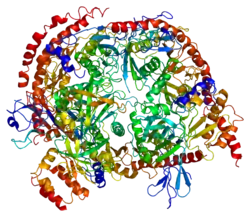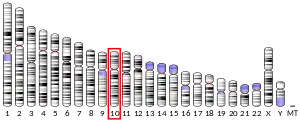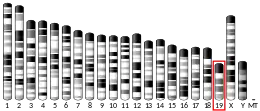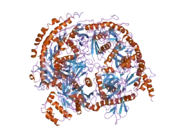| EXOSC1 | |||||||||||||||||||||||||||||||||||||||||||||||||||
|---|---|---|---|---|---|---|---|---|---|---|---|---|---|---|---|---|---|---|---|---|---|---|---|---|---|---|---|---|---|---|---|---|---|---|---|---|---|---|---|---|---|---|---|---|---|---|---|---|---|---|---|
 | |||||||||||||||||||||||||||||||||||||||||||||||||||
| |||||||||||||||||||||||||||||||||||||||||||||||||||
| Identifiers | |||||||||||||||||||||||||||||||||||||||||||||||||||
| Aliases | EXOSC1, CGI-108, CSL4, Csl4p, SKI4, Ski4p, hCsl4p, p13, Exosome component 1, PCH1F | ||||||||||||||||||||||||||||||||||||||||||||||||||
| External IDs | OMIM: 606493 MGI: 1913833 HomoloGene: 9359 GeneCards: EXOSC1 | ||||||||||||||||||||||||||||||||||||||||||||||||||
| |||||||||||||||||||||||||||||||||||||||||||||||||||
| |||||||||||||||||||||||||||||||||||||||||||||||||||
| |||||||||||||||||||||||||||||||||||||||||||||||||||
| |||||||||||||||||||||||||||||||||||||||||||||||||||
| |||||||||||||||||||||||||||||||||||||||||||||||||||
| Wikidata | |||||||||||||||||||||||||||||||||||||||||||||||||||
| |||||||||||||||||||||||||||||||||||||||||||||||||||
3'-5' exoribonuclease CSL4 homolog is an enzyme that in humans is encoded by the EXOSC1 gene.[5][6][7]
This gene encodes a core component of the exosome complex. The mammalian exosome is required for rapid degradation of AU rich element-containing RNAs but not for poly(A) shortening. The association of this protein with the exosome is mediated by protein-protein interactions with ribosomal RNA-processing protein 42 and ribosomal RNA-processing protein 46.[7]
Interactions
Exosome component 1 has been shown to interact with:
References
- 1 2 3 GRCh38: Ensembl release 89: ENSG00000171311 - Ensembl, May 2017
- 1 2 3 GRCm38: Ensembl release 89: ENSMUSG00000034321 - Ensembl, May 2017
- ↑ "Human PubMed Reference:". National Center for Biotechnology Information, U.S. National Library of Medicine.
- ↑ "Mouse PubMed Reference:". National Center for Biotechnology Information, U.S. National Library of Medicine.
- 1 2 3 Raijmakers R, Noordman YE, van Venrooij WJ, Pruijn GJ (Jan 2002). "Protein-protein interactions of hCsl4p with other human exosome subunits". J Mol Biol. 315 (4): 809–18. doi:10.1006/jmbi.2001.5265. PMID 11812149.
- ↑ Chen CY, Gherzi R, Ong SE, Chan EL, Raijmakers R, Pruijn GJ, Stoecklin G, Moroni C, Mann M, Karin M (Nov 2001). "AU binding proteins recruit the exosome to degrade ARE-containing mRNAs". Cell. 107 (4): 451–64. doi:10.1016/S0092-8674(01)00578-5. PMID 11719186. S2CID 14817671.
- 1 2 "Entrez Gene: EXOSC1 exosome component 1".
- 1 2 3 Raijmakers R, Egberts WV, van Venrooij WJ, Pruijn GJ (Nov 2002). "Protein-protein interactions between human exosome components support the assembly of RNase PH-type subunits into a six-membered PNPase-like ring". J. Mol. Biol. 323 (4): 653–63. doi:10.1016/s0022-2836(02)00947-6. PMID 12419256.
Further reading
- Lai CH, Chou CY, Ch'ang LY, et al. (2000). "Identification of novel human genes evolutionarily conserved in Caenorhabditis elegans by comparative proteomics". Genome Res. 10 (5): 703–13. doi:10.1101/gr.10.5.703. PMC 310876. PMID 10810093.
- van Hoof A, Staples RR, Baker RE, Parker R (2000). "Function of the ski4p (Csl4p) and Ski7p proteins in 3'-to-5' degradation of mRNA". Mol. Cell. Biol. 20 (21): 8230–43. doi:10.1128/MCB.20.21.8230-8243.2000. PMC 86432. PMID 11027292.
- Brouwer R, Allmang C, Raijmakers R, et al. (2001). "Three novel components of the human exosome". J. Biol. Chem. 276 (9): 6177–84. doi:10.1074/jbc.M007603200. hdl:2066/186951. PMID 11110791.
- Brouwer R, Vree Egberts WT, Hengstman GJ, et al. (2002). "Autoantibodies directed to novel components of the PM/Scl complex, the human exosome". Arthritis Res. 4 (2): 134–8. doi:10.1186/ar389. PMC 83843. PMID 11879549.
- Raijmakers R, Egberts WV, van Venrooij WJ, Pruijn GJ (2002). "Protein-protein interactions between human exosome components support the assembly of RNase PH-type subunits into a six-membered PNPase-like ring". J. Mol. Biol. 323 (4): 653–63. doi:10.1016/S0022-2836(02)00947-6. PMID 12419256.
- Strausberg RL, Feingold EA, Grouse LH, et al. (2003). "Generation and initial analysis of more than 15,000 full-length human and mouse cDNA sequences". Proc. Natl. Acad. Sci. U.S.A. 99 (26): 16899–903. Bibcode:2002PNAS...9916899M. doi:10.1073/pnas.242603899. PMC 139241. PMID 12477932.
- Ota T, Suzuki Y, Nishikawa T, et al. (2004). "Complete sequencing and characterization of 21,243 full-length human cDNAs". Nat. Genet. 36 (1): 40–5. doi:10.1038/ng1285. PMID 14702039.
- Deloukas P, Earthrowl ME, Grafham DV, et al. (2004). "The DNA sequence and comparative analysis of human chromosome 10". Nature. 429 (6990): 375–81. Bibcode:2004Natur.429..375D. doi:10.1038/nature02462. PMID 15164054.
- Lehner B, Sanderson CM (2004). "A protein interaction framework for human mRNA degradation". Genome Res. 14 (7): 1315–23. doi:10.1101/gr.2122004. PMC 442147. PMID 15231747.
- Gerhard DS, Wagner L, Feingold EA, et al. (2004). "The status, quality, and expansion of the NIH full-length cDNA project: the Mammalian Gene Collection (MGC)". Genome Res. 14 (10B): 2121–7. doi:10.1101/gr.2596504. PMC 528928. PMID 15489334.
- Andersen JS, Lam YW, Leung AK, et al. (2005). "Nucleolar proteome dynamics". Nature. 433 (7021): 77–83. Bibcode:2005Natur.433...77A. doi:10.1038/nature03207. PMID 15635413. S2CID 4344740.
- Rual JF, Venkatesan K, Hao T, et al. (2005). "Towards a proteome-scale map of the human protein-protein interaction network". Nature. 437 (7062): 1173–8. Bibcode:2005Natur.437.1173R. doi:10.1038/nature04209. PMID 16189514. S2CID 4427026.
- Kimura K, Wakamatsu A, Suzuki Y, et al. (2006). "Diversification of transcriptional modulation: large-scale identification and characterization of putative alternative promoters of human genes". Genome Res. 16 (1): 55–65. doi:10.1101/gr.4039406. PMC 1356129. PMID 16344560.
This article is issued from Wikipedia. The text is licensed under Creative Commons - Attribution - Sharealike. Additional terms may apply for the media files.




